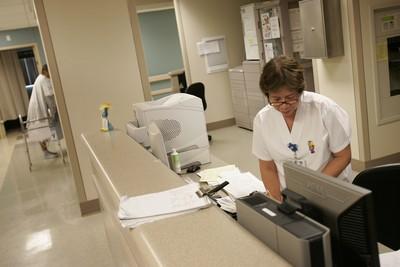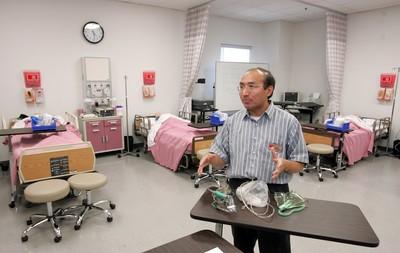Hospitals hire foreign nurses with care
When they interviewed nurses from Korea two years ago, administrators with St. Rose Dominican Hospitals realized the nurses would need to speak better English before dealing with patients.
The recruitment agency hired to arrange the meeting assured them the nurses would be proficient in a year, about the time it took for the nurses' visas to clear.
The administrators took them at their word, but when the five Korean nurses started orientation and training, it became obvious they still lacked the language skills for the job.
"We had real concerns about their accents. Their comprehension was horrible," said Rhonda Lem, manager of nursing retention and strategic staffing for St. Rose Dominican Hospitals, which has three campuses in the Las Vegas Valley.
St. Rose officials decided the nurses needed a better grasp of English before handling patients. So, after spending between $15,000 and $17,000 to recruit and train each of the five nurses, they sent them to take English courses at the University of Nevada, Las Vegas.
The recruiting agency picked up the tab, which ran about $800 to $900 per nurse, Lem said.
Since then, the hospital chain has decided not to recruit any more nurses from Korea, instead focusing its efforts on India and the Philippines, where nurses receive their occupational training in English.
After four decades of recruiting nurses from other countries during a nursing shortage, health care officials in the United States still are having trouble acclimating those nurses to Western society, argues one UNLV associate professor who is trying to bring attention to the issue.
Yu Xu, coordinator of UNLV's Ph.D. in Nursing program, is planning on developing a curriculum that can be used for hospitals nationwide.
Without proper training, "the nurses lose, the hospital loses and, most importantly, the American public loses," he said.
As the nation grapples with a nursing shortage, dependence on foreign-educated nurses has risen. They made up about 3.5 percent of the nursing work force in 2004, according to the Department of Health and Human Services.
Southern Nevada is far more dependent, with more than 15 percent of its nurses educated in another country, data from a 2005 University of Nevada School of Medicine report concluded.
Authors of the report believe the actual number could be higher.
They estimate that more than 1,500 of Clark County's 10,000 plus nurses are foreign-educated.
Nationwide, nurses from the Philippines make up just over half of all foreign-educated nurses, followed by nurses from Canada, at 20 percent, and the United Kingdom, at 8.4 percent, according to the federal Department of Health and Human Services.
The nursing profession has conducted little research into how to properly acclimate foreign nurses into the field, according to Cheryl Peterson, a senior policy analyst with the American Nurses Association.
"I think that we're finally paying attention to it," she said.
The association plans to hold a conference in Chicago next month to discuss what some hospitals have found to be the best methods for helping the nurses to adjust.
Hospitals rarely duplicate other, possibly more successful, transitional programs, instead choosing their own homegrown methods, Peterson said.
Perhaps in no other field is training as important for foreign-educated employees as it is in nursing, where the training of the employees can mean the difference between life and death, Xu said.
"Because of the communication issues and the transitional issues, this has a direct bearing on patient safety," Xu said.
Problems with foreign nurses can range from the humorous to the dangerous.
There's the Korean nurse at St. Rose Siena Hospital, for example, who burst into tears when she was told she would have to work the graveyard shift.
"She thought she was going to be working with dead people," Lem said. "Slang is very hard for them."
Then there's the case last year of more than 20 foreign nurses resigning from their jobs at a string of nursing homes in New York.
The nurses walked out of their jobs protesting unfair working conditions, according to news reports. Ten of them were subsequently charged in March with endangering children by leaving their posts.
Those nurses probably didn't understand that walking out on patients could be illegal in the United States, said Belen Gabato, a registered nurse and performance improvement analyst at University Medical Center and president of the Philippines Nurses Association of Nevada.
Of the five Korean nurses at St. Rose Dominican Hospitals, two are still at the hospital, where they've adjusted nicely, Lem said.
The hospital doesn't have plans to recruit more foreign nurses, although it's expecting a few dozen more previously recruited nurses to arrive once they've been awarded their visas, Lem said.
Most Asian nurses, which make up the majority of foreign nurses, are trained in English and with American textbooks, but must adapt to a role that is far more autonomous than the one they left behind.
They were taught in an environment where nurses took orders from doctors and didn't question them. That's far different in the United States, where they're allowed, and even expected, to contradict a doctor, Xu said.
The nurses also have to navigate a health care system laden with lawsuits, regulations and laws that didn't exist in their home country, Gabato said.
Laws such as the Nurse Practice Act are designed to protect the public, and improper training can lead to nurses violating the law, endangering the public and having their nursing licenses revoked, Gabato said.
Foreign nurses also face the reality of living in a new country, where everything -- from getting around town to finding groceries -- is new to them.
Lem said one of the biggest problems is public transportation. The nurses at St. Rose Dominican Hospitals, many of whom don't drive, often rotate between the chain's three locations. Bus trips between hospitals can take as long as two hours, she said.
Even normal bedside care can be new to them, especially for nurses from Korea and China, Xu said. In those countries, the family assumes many tasks that a nurse in America would do, such as bathing and feeding the patient.
The differences can spark cultural tension in the hospital, Gabato said.
At UMC, Filipino nurses make up the largest minority in the hospital, and their cultural habits are often misunderstood.
During a meeting earlier this year to discuss those differences, American nurses asked why Filipino nurses won't look them in the eye when talking to them and won't ask questions.
Gabato, who mediated much of the discussion, said looking someone in the eye is seen as a defiant gesture in Asian cultures; asking questions can make someone look foolish.
"When people understand that (and) talk about it without being sensitive about it ... then there's better understanding," Gabato said.
The major hospital chains in Southern Nevada said they employ different methods to help nurses adjust to the culture, including assigning the nurses mentors.
At Spring Valley Hospital, foreign nurses shadow an experienced nurse during their first 12 weeks to understand hospital policies and how to deal with patients, according to Margaret Covelli, the chief nursing officer for the hospital.
Xu, who has authored and co-authored several papers examining what foreign-educated nurses must go through when they move to the United States, will attend the American Nursing Association's conference next month.
He's also going to apply for funding from the National Council of State Boards of Nursing to develop a curriculum to acclimate the nurses.
Lem said any additional research would be positive. She said her hospital's training helps foreign nurses become just as qualified as nurses educated in the United States.
"We want to people to know, the nurse may have an accent, but they're just as capable as any other nurse."


















